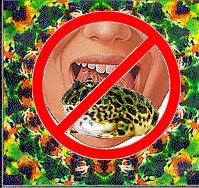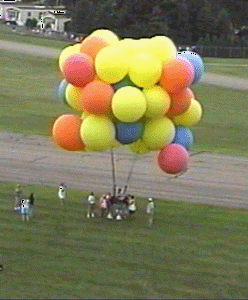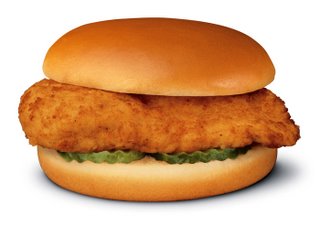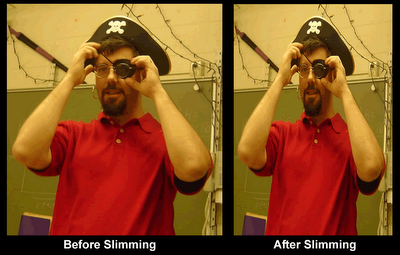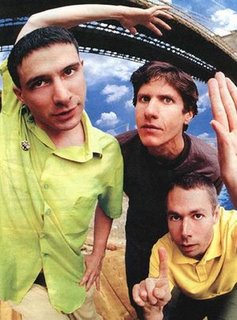Again to the local
library for reading material...this time it was Books-a-million for some Friday evening perusal...

I started with the third part in the
Ultimate Galactus saga:
Extinction. It's a nice wrap-up to the three-part story in which the Ultimate universe got to meet Captain Mar-Vel, Silver Surfer, the Vision, and a few other new folks, in the hopes of stopping the gigantic Gah Lak Tus, an entity of planet-devouring size of power.
In true Ultimate fashion, though, the Gah Lak Tus that they introduce has very little in common with the
Galactus of Kirby and Lee's original. Galactus was nothing more than a supremely powerful, really big guy - two arms, two legs, a funny hat, and butt kicking power on a cosmic scale - way less likely to be
parodied by
The Tick The Ultimate Gah Lak Tus, however, turns out to be a massive construct of distributed network intelligence that has evolved rather sophisticated means of preventing any resistance. The Ultimate heros, of course, find a way to stop Gah Lak Tus from devouring Earth.
The
series has a truly epic scale, beginning back in the first volume with Ultimate Vision calling together Ultimate X-Men and the Ultimates, and the scope has grown every since. The writing's pretty tight, and the artwork's solid. The middle chapter - introducing Ultimate Mar-Vel was a bit meandering, but needed for the final conclusion.
Give it a read. Good stuff and a nice addition to the Ultimate universe.

The picture to the right is not at all the cover of
Teen Titans: Life and Death that I read - check
Amazon's page for that, but this one's the original poposal that DC posted, and it's in way better quality.
Again and again, DC's doing a great job with collecting the
Infinite Crisis ties. This one sees the Teen Titans - who are being set up as moving further forward from being sidekicks to being the leading superteam in the DC universe (not that I imagine it'll ever happen, but in theory, the children would eventually have to mature and take the JLA's place). This volume plays up that expanding role further and further with the Titans taking on their deceased members - from Jason Todd to Titans West folks who have been reincarnated by Brother Blood.
The artwork's good stuff here, and the revalations to the Titans that the JLA played brain hockey with some villians is well played and rightfully shakes their faith in their mentors. The buildup to
Infinite Crisis and ripples from
Identity Crisis are growing more and more intricate to everything happening in the DC Universe, but I know I'm missing a lot of the story because I'm not doing everything in the
correct order, but that's life. I'll get the storyline eventually.
This is a must read for those who are heading toward
Infinite Crisis.

I haven't yet had a chance to read
JLA #1 - nor even
JLA #0, but I'll readily admit that all the craptacular buzz on the interweb has be fully geeked to get ahold of these things when they show up in a trade.
There are already
annotations and a whole
bunch of
reviews hanging on the magic interweb box.

I'm not entirely sure how to think about
Batman: City of Crime. It's a really big trade with a single story covering twelve issues - something in the range of
War Games and
Cataclysm - both of which wove in and out of the various Bat-titles for a year or so. This one, however, stuck to just one one title, covering
Detective Comics for a full year.
I can definitely say that
City of Crime sucked less than
War Games - which was horrific but wasn't as good as
Cataclysm. It's a much grittier story with Batman spending much of the time out of costume infliltrating the lower classes of Gotham to get information on The Body - the major evil force getting things moving all year long.
The portrayal of the underside of Gotham is excellent. The characterization of Batman is excellent, fully trusting of his Bat-family (Robin, in particular here) to take care of things but also willing to disappear without telling them exactly what he's heading off to do - fiercely independent while being totally reliant.
What didn't ring with me was the extreme violence in the story, the poor artwork, or the quick wrap up. I've seen a lot of reviews that think this is one of the best Batman story arcs in a number of years, but I just didn't see it. The missteps are too many, the problems too broad to make it anything more than a quality arc that had a reach extending just past its grasp.

I've had no problem getting behind the newest Batgirl - here seen in
Silent Running. She's written as a greater fighter than Batman himself but as someone who has begun her career as an absolute neophyte in the ways of the world, even so far as being unable to speak or understand much of the spoken world because of her training from birth as a stone killer.
It is in this trade that Cassandra Cain - Batgirl - finally breaks the wall of silence as she is - without her request, without her permission - mentally altered so that she can understand speech. In the process, she loses her first fight - no longer able to read every motion, every stance of her opponents, she finds herself not quite as able to be as perfect a fighter.
The trade allows for further characterization of Batgirl as well as Batman's growing trust and reliance on his new charge. We also get quality artwork in the cartoony style that's worked pretty well on the various
Batgirl trades - letting us see the naive girl who perhaps has killed but certainly fights just shy of being a killer.
It's almost a shame that this run had to end with One Year Later, because this was one of the best additions to the Bat-line of books - significantly better than
Nightwing and on par with
Birds of Prey.

As freaky as the
House of M storyline was for Marvel - the imaginary allowance granted to the artists and writers as well as setting up a perfect, non-cheating method for the reset button to be firmly pushed and for Marvel to scroll back so manyh of their characters.
The
House of M: World of M trade collects a number of the one-shot specials from the event, allowing us a number of good glimpses into the world that just might have been if the mutants were ever in control, and the stories are nicely chosen for the trade, but every one stops midstream, not allowing the interesting ideas introduced here ever develop and round out into great stories.
They're good. They're nice tastes, but they leave this reader lacking.

Wolverine's a unique character. He's the ultimate fighting machine, able to heal himself of almost any injury, and blessed with claws that could slice through anything and everything.
There's no one like him.
Except for X-23.
And Sabertooth.
And Lady Deathstrike.
And - as we see in this trade,
Wolverine: Return of the Native - there's apparently another unique perfect killing machine.
And she's being hunted by one of the other perfect killing machines who's being sent on the hunt by a third perfect killing machine.
The artwork's solid. The characters are written well.
And the story is boring.

As a general rule, I slag on the X-Men. I get confused by the constantly rotating teams, each book with some different X-team, and with the flipping and flopping of seemingly every bad guy who's good and good guy who's bad again.
But I actually like the New X-Men and enjoyed
Childhood's End. They have a decently stable lineup - and have since New X-Men was
Academy X. There is a little shake up in this volume as the whole thing opens immediately post
House of M when three quarters of the X-folks at the Academy have just lost their powers.
It's a nice character development to see how the various characters react to the change - sudden loss of powers by some, others wishing they had been depowered. The difference sets up an interesting inerplay between the mutants and suddenly non-mutants.
The artwork works well, along the lines of a more cartoonish style that
New X-Men has been plying since the start of the series. This is a decent ongoing series. One worth playing some catch-up with.

I dug Spike Lee's joint
Inside Man. The pacing is, admittedly, glacial, and that clearly got to some of the
reviewers, but I liked it.
The set up is simple: bank robber takes hostages and stalls in the bank. Hostage negotiator tries to figure out why bank robber is stalling.
It worked for me.
The score is outstanding, kicked off brilliantly by "Chiyya Chiyya" that I mentioned on Friday of last week, but consisting mostly of slower jazz numbers that set the tone nicely.
Denzel, Clive Owen, Willem Defoe, Jodie Foster, an Christopher Plummer do a solid job of acting, taking their parts and doing just what needs to be done with them - nothing revelatory, just good stuff.
The movie's an enjoyable journey. Not much happens that you couldn't quite see coming, and the resolution might leave some folks
wanting, but it's good for a couple of hours of your life.
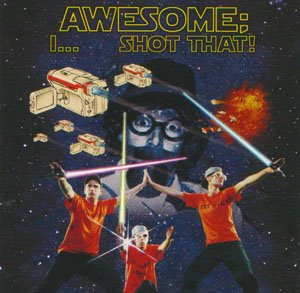
It's kind of tough to talk about the next movie, particularly because its title has the granddaddy of all swear word, but I'll give it a try.
I'm a massive freakin' Beastie Boys fan. I have all their albums and am dying to see them live. The next best thing, though, was seeing their concert doc
Awesome; I...Shot That!. You can check the trailer over on the
official site.
It's not a film for everybody 'cause it's a Beastie Boys concert. That's all.
The cool part is that they filmed it with a couple of professional photographers, but they also handed out fifty high-def camecorders to their fans and said "go to it, folks". They Boys - in full
Nathaniel Hornblower guize - then edited that footage together, adding a whole crapload of effects and producing a great concert documentary.
It's purely for
die-hards, though, as there's nothing more than a great concert with a quikc
Ben Stiller cameo.

I was pleasantly surprised at how much I ended up enjoying Gnarls Barkley's first release
St Elsewhere album. Of course, I'd heard the first couple of singles: "Crazy" and "Smiley Faces", and they were crazily catchy, but I just assumed that they'd have a couple of tunes I liked and not much more.
Not at all the case.
Sure, those two are - I'm pretty solid in saying this - the two best songs on the
album, but they're far from the only quality ones.
I really enjoyed "The Boogie Monster", "Feng Shui", and "The Last Time". Hell, the whole album's
catchy throughout, though the third single - a cover of "Gone Daddy Gone" doesn't do much for me.
It's been in decently heavy rotation on my iTunes since I grabbed it, and it'll likely stay there.
Good stuff. Not too rappish for anybody. Rockin' enough for just about all but the hardest-core rockers. Funk, soul, rap, rock, guitars, synth, old school, new. It's a fascinating amalgam of what's out there in music right now.
It's the soundtrack.

Up there - actually, slightly above there - with the Beasties for me is Wilco. My cousin intro'ed me to
Uncle Tupelo back in high school, and I follwed them along for a while. When the band broke up, Sun Volt looked to be way more promising, but Wilco has rocked on and left Sun Volt so badly in the dust that any dreams of competition or rivalry have become jokes.
Jeff Tweedy is pretty much the driving, creative force behind
Wilco, and I think he might be the only consistent member since the band's beginning. Apparently - and luckily for his fans, Tweedy gets bored from time to time and dabbles in side projects: The Minus Five, Loose Fur, solo work, and Golden Smog.
The Smog's first couple of albums were Tweedy-heavy enough that I enjoyed a fair bit of them. The third one -
Another Fine Day is a little Tweedy-light for my tastes. It's not a bad album - as most reviews have said, it's probably the
group's best. But it's just not my tastes.
The album's pleasant enough. NPR gave it a
good review, as have most of the
critics, but it's just a little too pleasant and bland for my tastes.
Gimme the real thing any day.

Continuing the Stephen King book on tape that I've been on, I worked through
From a Buick 8, a tale of a troop of PA state troopers who take care of a mysterious and powerful force in their midst.
It's vintage King as we never get the full story of why or quite how the Buick came into the troopers' handling, how the Buick does what it ends up doing, or what's going to happen to the Buick as the story fades out. It's also vintage King because he does a wonderful job creating amazingly rich characters and backgrounds for his tales, so rich here, in fact, that the characters become the major story.
The relationships, the caring, the love that span the two decades of the story are what really matter here, the small actions that go through the day to day of their lives. It isn't the occasionally fantastic outbursts from the Buick that matter to them; it's the protection and safety that they grant to us John Q's.
The creation of this trooper family is so rich and wonderful that I was fully prepared to call this King's greatest
stand alone book, the enclosure of the tightly knit group so wonderful. And then the book didn't stop.
There were obvious - and I thought likely more rewarding - places to end the book, but King goes further, turning a book that is about the overarching unknowable-ness of things into a
tome with a much more standard conclusion. The conclusion is dramatic, to be sure, but it doesn't fit with the tone of the rest of the
tale.
And then it doesn't end again.
Instead, King gives us another false ending followed up the eventually correct fade out, the lesson that we can simply outlive just about anything if we take good enough care of each other and don't worry ourselves too much about things along the way.
The jarring drama of the first false ending doesn't ruin the book, but it does lessen it.
Very good...the first three quarters are excellent, outstanding...the last quarter isn't anything special...
Take that and your "short entries since school started" comment and stick 'em, Morin...
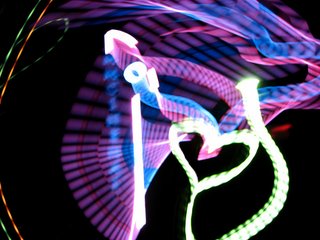 What a cool idea. It's called a camera toss. You set your camera for a one-second exposure and chuck it to a sure-handed friend. Neat imagry abounds.
What a cool idea. It's called a camera toss. You set your camera for a one-second exposure and chuck it to a sure-handed friend. Neat imagry abounds.
